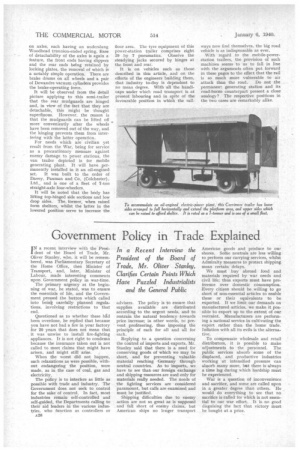Government Policy in Trade Explained
Page 36

If you've noticed an error in this article please click here to report it so we can fix it.
In a Recent Interview the President of the Board of Trade, Mr. Oliver Stanley, Clarifies Certain Points Which Have Puzzled Industrialists
and the General Public
IN a recent interview with the Presi1 dent of the Board of Trade, Mr. Oliver Stanley, who, it will be remembered, was Parliamentary Secretary of the Home Office, then Minister of Transport, and, later, Minister of Labour, made interesting comments upon Government policy in war-time.
The primary urgency at the beginning of war, he stated, was to ensure the essentials of life, and the Government pressed the button which called into beirt carefully planned regulations, involving restrictions to that end.
Questioned as to whether these had been overdone, he replied that because you have not had a fire in your factory for 20 years that does not mean that it was unwise to install fire-fighting appliances. It is not right to condemn because the insurance taken out is not called to meet claims that might have arisen, and might still arise.
When the worst did not happen, such relaxations as were possible, without endangering the position, were made, as in the case of coal, gas and electricity.
The policy is to interfere as little as possible with trade and industry. The Government does not seek to control for the sake of control. In fact, most industries remain self-controlled and self-guided, the Departments calling to their aid leaders in the various industries, who function as controllers or A26 advisers. The policy is to ensure that supplies available are distributed according to the urgent needs, and to restrain the natural tendency towards price increase; in other words, to prevent profiteering, thus imposing the principle of each for all and all for each.
Replying to a question concerning the control of imports and exports, Mr. Stanley said that there is a need for conserving goods of which we may be short, and for preventing valuable material reaching Germany through neutral countries. As to imports, we have to see that our foreign exchange and shipping resources are used only for materials really needed. The needs of the fighting services are considered paramount, but calls are examined and must be justified.
Shipping difficulties due to enemy action are not so great as is supposed and fall short of enemy claims, but American ships no longer transport American goods and produce to our shores. Some neutrals are less willing to perform our carrying services, whilst Admiralty measures to protect shipping mean certain delays.
We must buy abroad food and materials required by war needs and civil life; thus exports must have preference over domestic cOnsumption. Every citizen should he willing to go short of non-essential articles to enable these or their equivalents to be exported. If we limit our demands on manufactured articles, we make it possible to export up to the extent of our restraint. Manufacturers are performing a national service in cultivating the export rather than the home trade. Inflation with all its evils is the alternative.
To compensate wholesale and retail distributors, it is possible to make adjustments to the personnel. The public services absorb some of the displaced, and productive industries working at intensified pressure can absorb many more, bet there is always a time lag during which hardship must he experienced.
War is a question of inconveniOnce and sacrifice, and some are called upon in a greater degree than others. He would do everything to see that no sacrifice is called for which is not essential to our war effort. It is no good disguising the fact that victory must be bought at a price.




























































